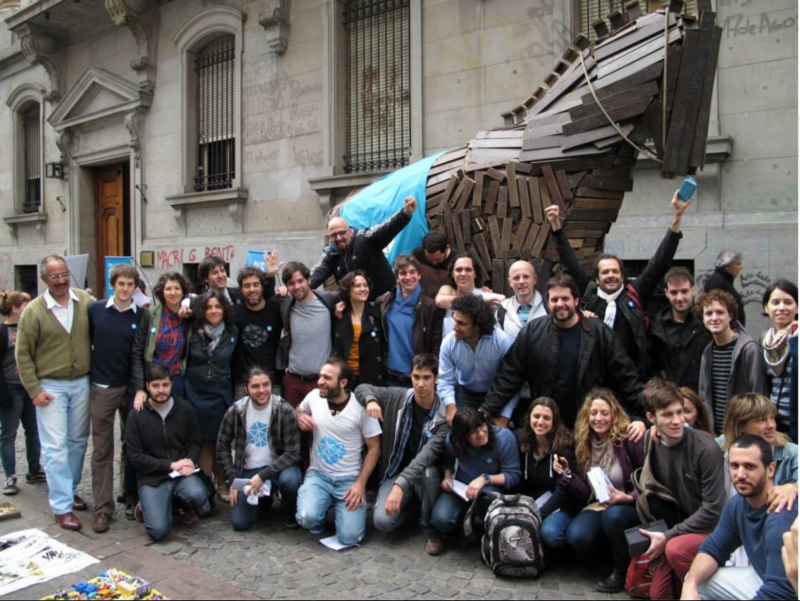If you can’t beat them, abstract them.
Four years ago, with a group of peers, we started in Argentina a new kind of political party, el Partido de la Red (Net Party). We were…
Four years ago, with a group of peers, we started in Argentina a new kind of political party, el Partido de la Red (Net Party). We were frustrated and frankly, pissed off at how things are run in politics and wanted to break into the political system to bring it to the 21st century. Political institutions are one of the most entrenched and hard to break pieces of the legacy system we are still governed by. So we decided to try and hack it, build a political party that would only make decisions in Congress, according to what citizens voted on an open source software called DemocracyOS. We built a wooden trojan horse, took it to Congress and kickstarted our campaign.

It was all fun & games until we faced the actual bureaucratic process of building the party… The ordeal included innumerable trips to government’s dusty warehouses to pick up boxes of paper forms that we needed to get people on the street to fill out (in triplicate) — all 18000 forms had to be ordered manually in alphabetical order — trips to an underground office straight out of Kafka’s book — plastic plants and all — where the whole directory of the party had to show up together to sign in person god knows what; printed notifications sent to every political group in the country and a very scary visit to a federal judge to defend our right to use the word ‘Red’(network); amongst other delights.
And all of this, in totally unrealistic deadlines, while trying to run a campaign with NO FUNDS. Why? Because there was no way for us to legally raise them. We set up a crowdfunding campaign but had no way of getting out the funds without a bank account and the legislation does not contemplate online donations. We couldn’t open a bank account until we had our party approved and it took so ridiculously long to get the party temporarily approved that we almost missed the chance to run altogether.
Seriously, this is run full BI (before-internet) mode. What were our options? run a campaign with no funds, get vendors to patiently wait until we had a way of legally paying them, getting our donors to pay for stuff or wire donations to personal bank accounts from where we then could paid vendors, both of which provide zero accountability. We had no way to raise funds and spend them transparently to support our mission. This is simply unacceptable.
There has to be a way of doing this better for everyone else. The cost and overhead of doing things the legacy way is stifling. Imagine how many amazing ideas, cutting edge ventures or movements that are pushing boundaries can’t thrive or die altogether for lack of an alternative.
El Partido de la Red and DemocracyOS taught me one fundamental lesson:
If you can’t beat them, abstract them.
The way out is to essentially abstract the government layer for groups around the world, create the browser on top of nation-state’s outdated operating system. Together with Xavier Damman and Aseem Sood we set out to find a way of doing it. Not an easy task, but one that has been a bit of an obsession of mine.
The idea here is: In the same way we rent a server in the cloud we should be able to rent a virtual instance of an existing entity with its bank account. It simply doesn’t make sense today that all groups need to go through the same government’s red tape overhead to start operating. The way to do it, is through a network of host organisations that rent out these virtual instances to Open Collectives around the world. We then build a virtual layer between groups and our legacy institutions and by removing friction to successfully do things that require funding, we hope to free space in creative minds and give them sustainability.
So what about governments? Governments should treat host organisations in the same way in the 90s they started treating web hosting companies and publishing platforms: responsible for monitoring and bringing down illegal content but not liable for the content itself.
Why can’t Uber drivers from Mexico, USA and Canada, create one single union? They are, after all, dealing with one company, one same interface, one algorithm. Why do novel political parties, those trying to upgrade our system, have to wait for the defenders of that same system to approve their existence to operate? Why do people venturing out to try a new idea, product, software, need to pay the government’s red tape overhead so early? Why are open source projects with contributors from all over the world unable to raise funds as a global collective? This is 2016, institutions at least a century old, won’t cut it anymore. Open Collectives are the organisations our generation is creating and we are set to power them and allow for new things to appear in the world.
The revolution will not be incorporated.
I’m extremely grateful that we’ve come full circle and are now setting up Partido Digital in Uruguay as an Open Collective, ready to crowdfund itself to Congress!
Join us! Reach out to us through Discord

